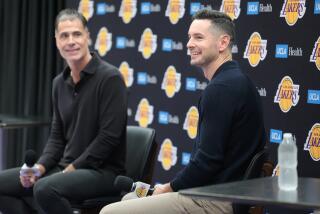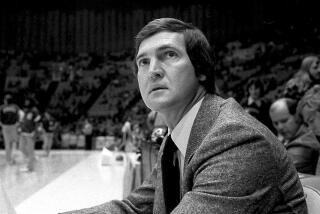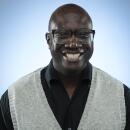Lakers’ Morrison is thinking forward
- Share via
Adam Morrison has made his peace with the player he is and the one he believes he still can become.
Others have heaped criticism on Morrison, 24, for not living up to the immense expectations placed on him when Charlotte Bobcats co-owner Michael Jordan selected him as the third overall pick in the 2006 NBA draft.
Not long ago, Morrison was one of the biggest stars in college, leading the nation in scoring with 28.1 points a game for Gonzaga.
In his first season with the Bobcats, Morrison had the look of a talented player when he averaged 11.8 points and was named to the NBA’s All-Rookie second team. Then Morrison tore his anterior cruciate ligament in his left knee during a 2007 exhibition against the Lakers and missed all of last season.
Last month, in a salary move, the Lakers traded Vladimir Radmanovic to Charlotte for Morrison and Shannon Brown. Morrison, a 6-foot-8 forward, has played only 28 minutes in four games for the Lakers since being acquired five weeks ago.
Morrison has heard plenty about how he was a great college player, but he has yet to deliver in the pros.
“I think some of it’s fair to say,” Morrison said. “But then some of it is not. This is [really] my second season. I came off an ACL surgery. My career is not . . . close to being over.”
Morrison has played in 48 games this season and is averaging 4.4 points per game. Known as a shooter, he is making just 36.4% of his shots, and 33.7% of his three-point attempts. Larry Brown, his third Bobcats coach, became worried about Morrison’s shooting woes after a December loss to New York.
“After he missed those first couple [shots], he didn’t even look at the basket,” Brown said after the game. “As soon as I heard someone yell at him [from the crowd], I ran a play for him. And he didn’t touch it.”
Morrison said his knee still isn’t fully sound and that’s affected him, because as a jump shooter he needs all the lift he can get. Yet the pundits, he said, disregard his injury, and seem to forget what he accomplished as a rookie.
“That’s the one thing that does bother me,” Morrison said. “It was like I didn’t really do anything that year. Then now I come off the surgery and I don’t really get the benefit of the doubt until I get healthy. But this is a business and this is the pros so I understand how some people are.”
When Morrison was traded, Lakers Coach Phil Jackson noted his prolific scoring in college but understood what Morrison was going through. Jackson recalled how two of his New York Knicks teammates in the 1960s dealt with great expectations after their college careers and made the transition into successful role players in the NBA.
Jackson told Morrison how Bill Bradley averaged 30.2 points a game at Princeton and was selected the national player of the year in 1965 but averaged only 12.4 points during 10 seasons with the Knicks. He also told Morrison about Cazzie Russell, who averaged 30.8 points in 1966 at Michigan and was also chosen the college basketball player of the year but averaged 15.1 points over 12 pro seasons.
“That was just an example I used for [Morrison] just to let him know that we’re not inhibiting his career,” Jackson said.
The pressure to succeed was magnified in college when Morrison was compared to Larry Bird.
“I think every good white, American player that comes out, he’s compared to Larry Bird,” said Morrison. “That’s just how it works. I never felt it as a burden.”
For Morrison’s critics, though, his poor shooting and demotion to the bench prove the point that he hasn’t been successful in the pros.
“It really doesn’t bother me one bit,” said Morrison, who had his fourth-year option for next season at $5.2 million picked up by Charlotte. “People have their own opinions. That’s fine. I have a job in the NBA. I can’t complain.”
Morrison is no stranger to basketball fans in Southern California, especially to UCLA fans who remember him lying on the court in tears after the Bruins rallied to beat the Bulldogs in the 2006 NCAA tournament.
“I wasn’t the first player to cry,” Morrison said. “Maybe it was because I was one of the best players in the nation at that time in college. But it was over-dramatized.”
Besides trying to rebuild his knee, Morrison has other health concerns. Morrison is a Type 1 diabetic who regulates his blood sugar with an insulin pump. He watches what he eats -- including having a steak and baked potato a couple hours before each game.
After a recent game, Morrison pulled on a T-shirt bearing the image of Che Guevara, who helped lead the Cuban revolution. Morrison read Guevara’s biography and saw a few documentaries that prompted his interest. “I like to have a free mind, an open mind about anything from politics to religion,” he said.
His strong beliefs lead Morrison to still think he’ll prosper in the NBA. He knows the Lakers have a talented bench and he doesn’t have a defined role this season.
So as his knee gets healthier and as he learns the Lakers’ triangle offense, a system Morrison thinks suits his game, he’s willing to wait.
“I knew coming here that [playing] time would be limited,” Morrison said. “I think it’s more about next season for me. I’m still very confident.”
--
More to Read
All things Lakers, all the time.
Get all the Lakers news you need in Dan Woike's weekly newsletter.
You may occasionally receive promotional content from the Los Angeles Times.







